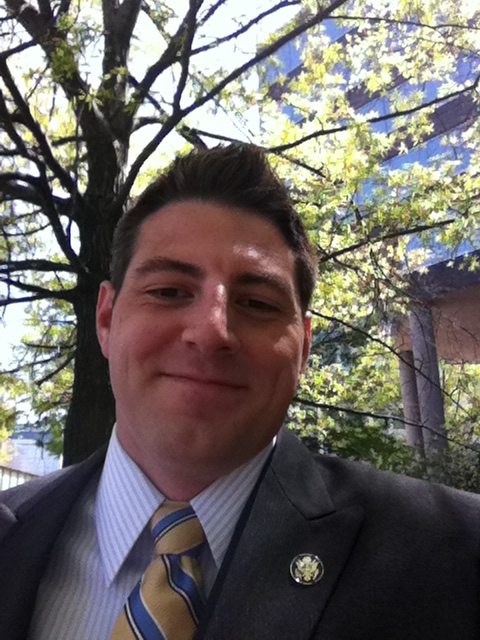 Every so often, we’ll chat with an alum about what they do and how they got there. Today we’re talking with program auditor Mark DeNome ’07, emergency health services, ’10, master’s of public policy, about the path he took to UMBC and — ultimately — a career he truly loves.
Every so often, we’ll chat with an alum about what they do and how they got there. Today we’re talking with program auditor Mark DeNome ’07, emergency health services, ’10, master’s of public policy, about the path he took to UMBC and — ultimately — a career he truly loves.
Name: Mark DeNome
Job Title: Program Auditor
Employer: BNL Incorporated
Scholarships Received at UMBC: President’s Fellow Scholarship; Bill Hathaway Award
Q: Tell us a little about how you wound up at UMBC. What’s your background?
A: I was born and raised in Morgantown, West Virginia, by a single mother on a teacher’s salary. I was already well-acquainted with the primary in-state university most of my classmates selected; however, I knew for a true personal advancement, I would need to find an out-of-state school where I might get significant financial aid. I had a great experience on my campus tour, where I heard the inspiring Freeman Hrabowski speak and came across an exciting major in EHS that was new to me. The prospect of joining UMBC’s fine lacrosse team appealed to me, but what most influenced my decision was the nature of UMBC and the surrounding community to be both immersed yet intimate, a logical step between my rural upbringing and the hustle of the city. UMBC was an university, up-and-coming like I wanted to be.
Q: How important was it to you to receive scholarships?
A: Maybe I still would have come to UMBC, but I would have been in too much debt after undergrad to attend graduate school, at least right away. Or, maybe I would have stayed in my hometown and not have been exposed to such diverse demographics and ideas, nor have been able to re-invent myself with a new population which I think is very important for post-high school graduates. Also, I would have been working during semesters. Something so many people just do not understand is that focusing on coursework without having to work is a luxury, so I was fortunate UMBC tries to uphold that one does not have to be rich to be smart.
Q: What drove your decision to study EHS as an undergraduate, and then Public Policy as a graduate student?
A: I decided at age fourteen that I wanted to be a doctor, and recognized EHS as a program that would best prepare me and also set me apart from other applicants, which it succeeded in doing. However, once I was exposed to health care as a medical professional and started to understand some of the inefficiencies in the industry, I wanted to get involved in that right away. The Public Policy Department accepted me, and I maintained close ties with the EHS Department as I pursued my concentration in Health Politics.
Q: Tell us about your career. Were there any lessons you learned, in particular, at UMBC that you carried with you into your work?
A: After more than fifty applications and several jobs below my abilities (not requiring any degree), I was encouraged by a fellow classmate to take an entry level job as a government consultant in emergency management, where I collected the nickname Cupcake from my nature to do the less desirable tasks willingly. As I executed assignments with excellence for my colleagues, I was given more and more responsibility; what had carried over from UMBC was the sense of we “take care of each other.” Today, I lead a team of government auditors. I am glad to be in a position where I can hire and empower driven individuals of all demographics who demonstrate their character in overcoming challenges, and I take pride in the look of pleasant surprise I get from colleagues when they learn I attended UMBC, and they see me for the first time as not what they expected of a white male manager in Northern Virginia.
Q: Is there a particular class or professor who really inspired you?
A: No question, my undergraduate adviser and Paramedic Instructor, Dwight Polk, instilled professionalism and showed compassion to all EHS students and alumnis, as did all the EHS staff, from whom I still receive job announcements via email. I have to acknowledge Mark Perks, who would take attendance in organic chemistry by stating the name of every student so so he knew each one, and those were 200 tough names to remember. At the graduate level, my government budgeting course, taught by Roy Meyers, advanced my analytical abilities and introduced me to several tools I consider very useful to the government contractors in the region.
Q: What advice would you give to students considering UMBC?
A: Realize that the world wants you to succeed, and that each moment is an opportunity to demonstrate your character to someone who wants to help a person who shares passion for the same things. And there is a lot we share.
Tags: career q&a

